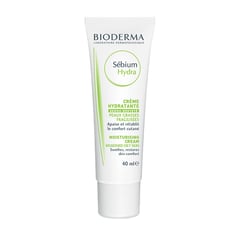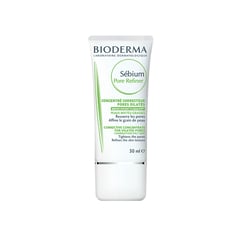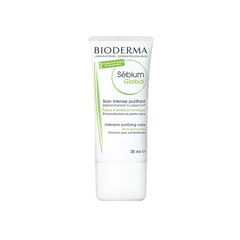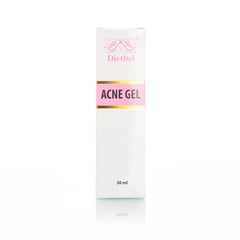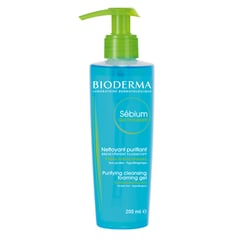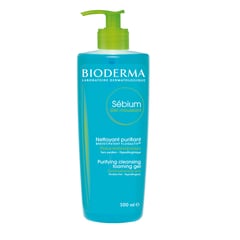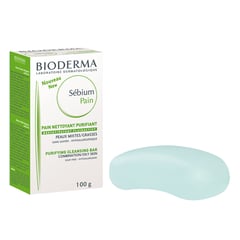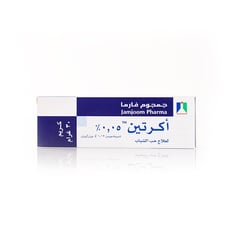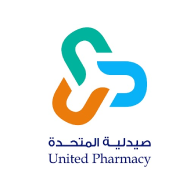Acretin C 1.2 % - 0.025 % Gel 30 Gm
33.80

In stock
SKU :
1018-JP106
A valid medical prescription is required to dispense this medication
Clindamycin is an antibiotic. It limits the growth of bacteria associated with
acne and the inflammation caused by these bacteria.
What this product is and what it is used for
Acretin C™ Gel contains the active substances clindamycin and tretinoin.
Clindamycin is an antibiotic. It limits the growth of bacteria associated with
acne and the inflammation caused by these bacteria.
Tretinoin normalizes the growth of superficial skin cells and causes normal
shedding of the cells that clog the hair follicles in areas with acne. This
prevents the build-up of sebum and the formation of early acne lesions
(blackheads and whiteheads).
These active substances are more effective when combined than when used
separately.
Acretin C™ Gel is used on the skin to treat acne in patients 12 years and older.
2. What you need to know before you use this product
• If you are allergic to clindamycin, tretinoin, or any of the other ingredients of
this medicine (listed in section 6).
• If you are allergic to lincomycin.
• If you have a chronic inflammatory bowel disease
(e.g. Crohn’s disease or ulcerative colitis).
• If you have a history of colitis with past antibiotic use which is characterised
by prolonged or significant diarrhoea or abdominal cramps.
• If you or a member of your family have ever suffered from skin cancer.
• If you are suffering from acute eczema which is characterised by inflamed,
red, dry and scaly skin.
• If you are suffering from rosacea, a skin disease which affects the face and is
characterised by redness, pimples and peeling.
• If you are suffering from other acute inflammatory conditions of the skin
(e.g. folliculitis), especially around the mouth (perioral dermatitis).
• If you are suffering from certain special forms of acne vulgaris characterized
by pustular and deep cystic nodular acne lesions (acne conglobata and acne
fulminans).
If any of the above applies to you, do not use this medicine and talk to your
doctor.
Warnings and precautions
• Avoid contact of this medicine with the mouth, eyes, mucous membranes and
with abraded or eczematous skin. Be careful when applying to sensitive areas
of skin. In case of accidental contact with the eyes, rinse with plenty of
lukewarm water.
• You should not use Acretin C™ if you are pregnant, especially during the first
three months of the pregnancy. If you are a woman of childbearing potential,
you should not use Acretin C™ unless you are using contraception (see also
section “Pregnancy, breast-feeding and fertility”).
• If prolonged or significant diarrhoea or abdominal cramps occur, stop using
this medicine and talk to your doctor immediately.
• If you have atopic eczema (chronic, itching inflammation of the skin), please
talk to your doctor before using this medicine.
• Exposure to natural or artificial light (such as a sunlamp) should be avoided.
This is because this medicine may make your skin more sensitive to sunburn
and other adverse effects of the sun.
An effective sunscreen with Sun Protection Factor (SPF) of at least 30 and
protective clothing (such as a hat) should be used any time you are outside.
If nevertheless your face becomes sunburnt, stop medication until your skin
has healed.
• Talk to your doctor in case an acute inflammation of the skin occurs when
using this medicine.
• Acretin C™ should not be applied at the same time as other preparations used
on the skin including cosmetics (see also section “Other medicines and
Acretin C™”).
Other medicines and Acretin C™
Please tell your doctor or pharmacist if you are taking or have recently taken
or might take any other medicines. This includes medicines that you buy
without a prescription or herbal medicines. This is because Acretin C™ can
affect the way some other medicines work. Also some other medicines can
affect the way Acretin C™ works.
If you have used any preparations that contain sulphur, salicylic acid, benzoyl
peroxide or rescinol or any chemical abrasives; you will need to wait until the
effect of those have subsided until you start using this medicine. Your doctor
will tell you when you can start using Acretin C™.
Do not use medicated soaps cleansers or scrubbing solutions with strong
drying effect during treatment with Acretin C™. You should be careful when
using the following that may have a drying effect: abrasive soaps, soaps and
cosmetics and products with high concentrations of alcohol, astringents,
spices or lime.
You should ask your doctor for advice before using this medicine together
with other medicinal products containing erythromycin or metronidazole,
aminoglycosides, other antibiotics or corticosteroids or if you are receiving
neuro- muscular blocking medicines e.g muscle relaxants used in anaesthesia.
Warfarin or similar medicines used to thin the blood; you may be more likely
to have a bleed. Your doctor may need to take regular blood tests to check
how well your blood can clot.
Pregnancy, breast-feeding and fertility
If you are pregnant or breast-feeding, thinking you may be pregnant or are
planning to have a baby, ask your doctor or pharmacist for advice before
taking this medicine.
You should not use this medicine if you are pregnant, especially during the
first three months of the pregnancy, or if you are breastfeeding. It is not
known if Acretin C™ may harm your unborn baby or pass through your milk
and harm your baby.
If you are a woman of child-bearing age you should use contraception
while using this medicine and for one month after discontinuation of
treatment.
Driving and using machines
Acretin C™ is unlikely to have an effect on the ability to drive or operate
machines.
Important information about some of the ingredients of Acretin C™ gel
Acretin C™ contains Propylene glycol and Butyl hydroxytoluene which
may cause local skin reactions (e.g. contact dermatitis), or irritation to the eyes
and mucous membranes.
3. How to use this product.
Always use this medicine exactly as your doctor has told you. Check with
your doctor or pharmacist if you are not sure.
The recommended dose is:
A pea-sized amount of Acretin C™ should be applied once daily at bedtime.
Method of administration
Wash your face gently with mild soap and warm water and pat your skin dry
with a towel. Squeeze a pea-sized amount of gel onto the fingertip. Dab the
gel on your forehead, chin, nose and both cheeks, and then gently spread it
evenly over your whole face.
Do not use more than the amount that has been suggested by your doctor, or
apply the product more frequently than instructed. Too much medication may
irritate the skin, and will not give faster or better results.
Duration of treatment
To get the best results with Acretin C™, it is necessary to use it properly and
not stop using it as soon as your acne starts to get better. Typically, it may
take several weeks to have an optimal effect. In some cases, it may take up to
12 weeks. Please contact your doctor if symptoms persist for more than 12
weeks, as your doctor will need to re-evaluate your treatment.
If you use more Acretin C™ than you should
You will not get faster or better results by using more Acretin C™ than
recommended. If you use too much a marked redness, peeling, or discomfort
may occur. In such cases, the face should be gently washed with a mild soap
and lukewarm water. The use of this medicine should be stopped until all
these symptoms have gone away.
Overdose may also result in side effects from your stomach and intenstine;
including stomach pain, nausea, vomiting and diarrhoea. In such cases, the use
of this medicine should be discontinued and your doctor should be contacted.
Acretin C™ is only for use on the skin. In case of accidental ingestion, contact
your doctor or go to the nearest hospital casualty department immediately.
If you forget to use Acretin C™
If you forget to use Acretin C™ at bedtime, you should apply the next dose at
the usual time. You should not double the dose to make up for the forgotten
dose.
If you have any further questions on the use of this product, ask your doctor or
pharmacist.
4. Possible side effects
Like all medicines, this medicine can cause side effects, although not
everybody gets them.
Uncommon: may affect up to 1 in 100 people
• Acne, dry skin, redness of the skin, increased sebum production,
photosensitivity reaction, itching, rash, scaly rash, scaling of the skin, sunburn
• Application site reactions such as burning, inflamed skin, dryness, redness of
the skin
Rare: may affect up to 1 in 1,000 people
• Hypersensitivity
• Underactive thyroid gland (symptoms may include fatigue, weakness,
weight gain, dry hair, rough pale skin, hair loss, increased sensitivity to cold).
• Headache
• Eye irritation
• Gastroenteritis (inflammation of any part of the gastro- intestinal tract),
nausea
• Inflamed skin, herpes simplex (cold sore), macular rash (small, flat, red
spots), skin bleeding, skin burning sensa- tion, loss of skin pigmentation, skin
irritation
• Application site symptoms such as irritation, swelling, superficial skin
damage, discolouration, itching, scaling
• Feeling hot, pain
Reporting of side effects
If you get any side effects, talk to your doctor or pharmacist. This includes
any possible side effects not listed in this leaflet. By reporting side effects you
can help provide more information on the safety of this medicine.
5. How to store this product
Keep out of the sight and reach of children.
Do not store above 30 °C.
Keep the tube tightly closed.
Do not use this medicine after the expiry date which is stated on the carton
and tube after “EXP”.
Discard the tube after 3 months from opening.
Do not throw away any medicines via wastewater or household waste. Ask
your pharmacist how to throw away medicines you no longer use. These
measures will help protect the environment.
| Shipping Type | Express |
|---|
Write Your Own Review
The largest selection of casino games and sports bets at 1xbet app.



